Sir John Monash, Personal Files Book 5, 25 May - 10 June 1915, Part 10
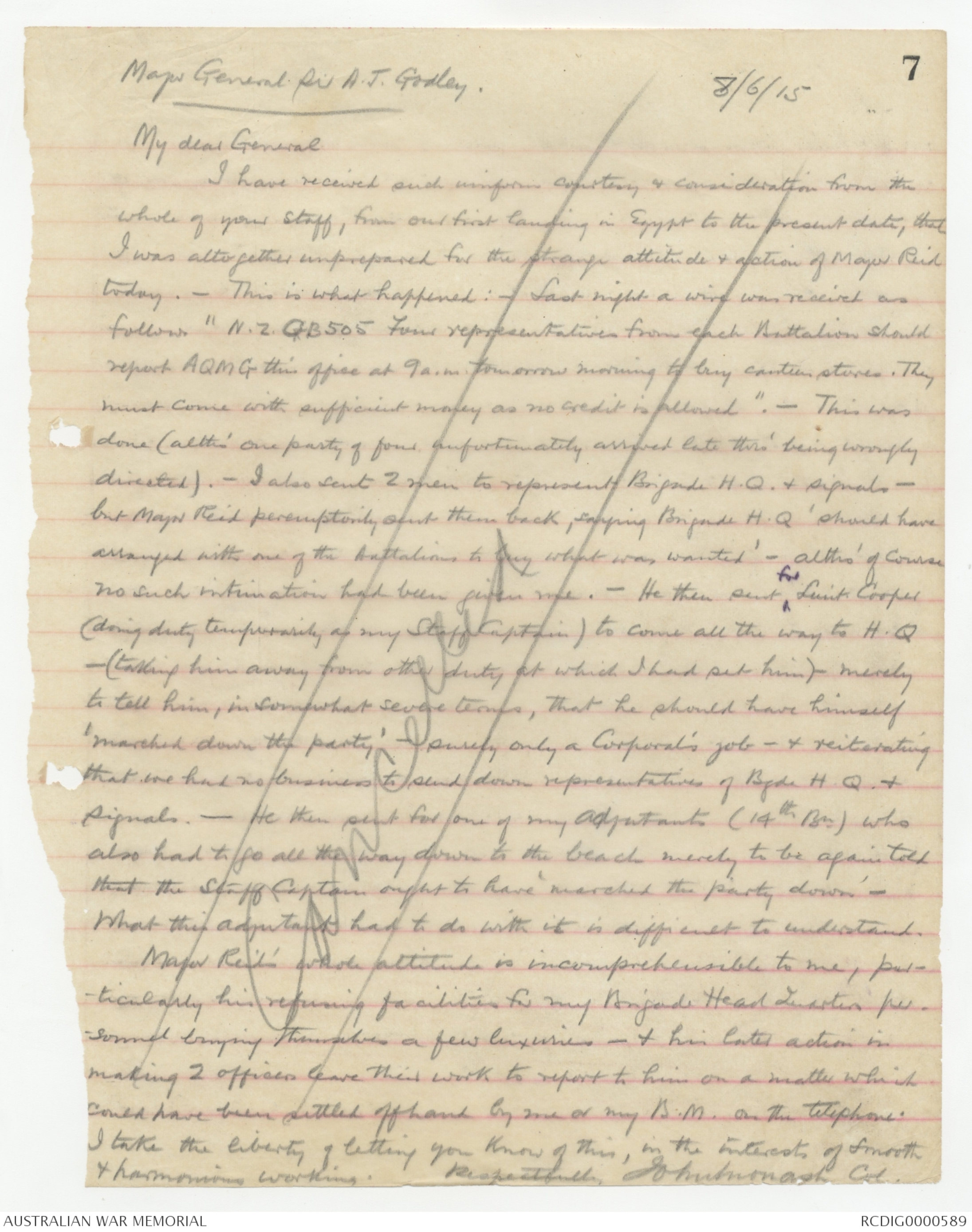
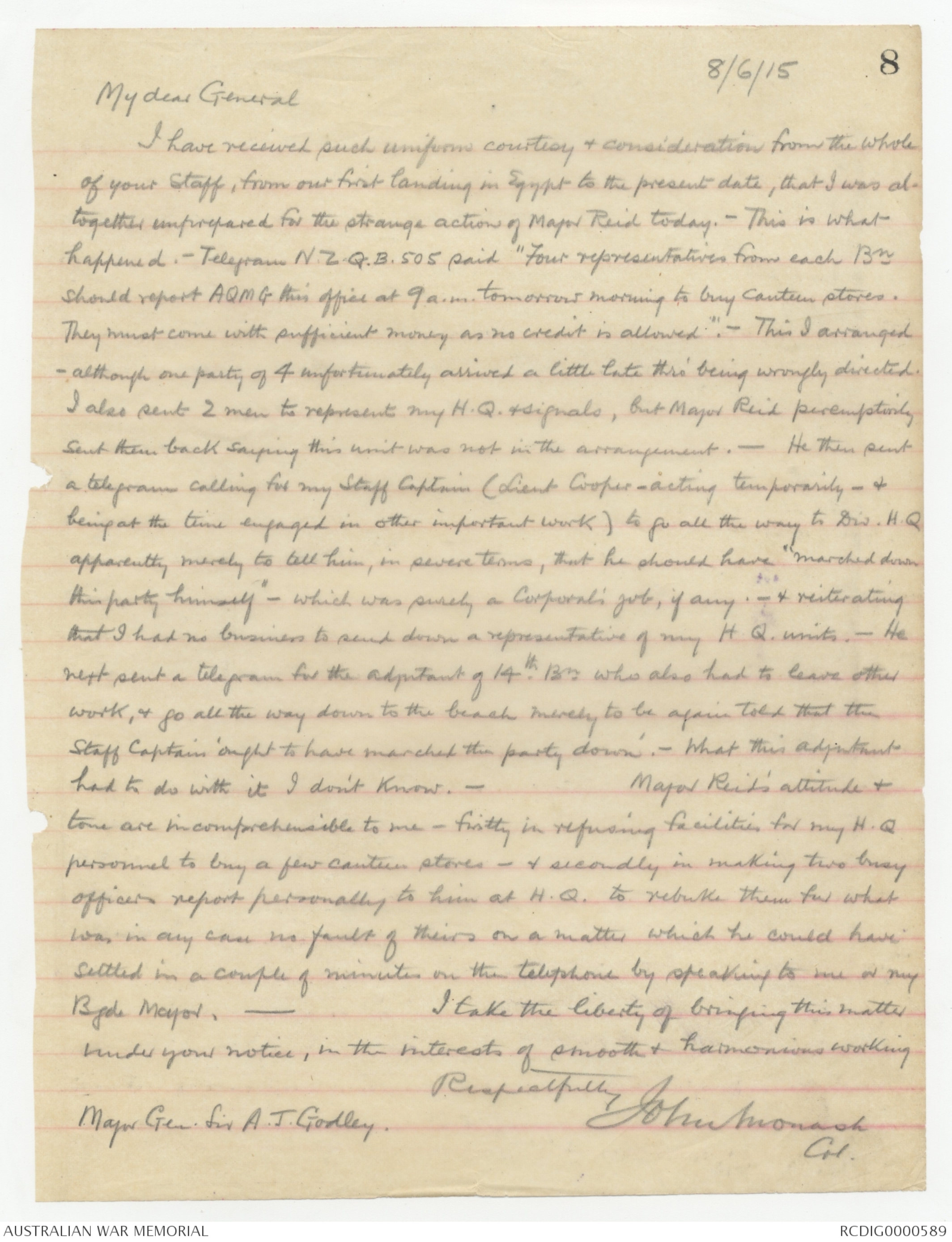
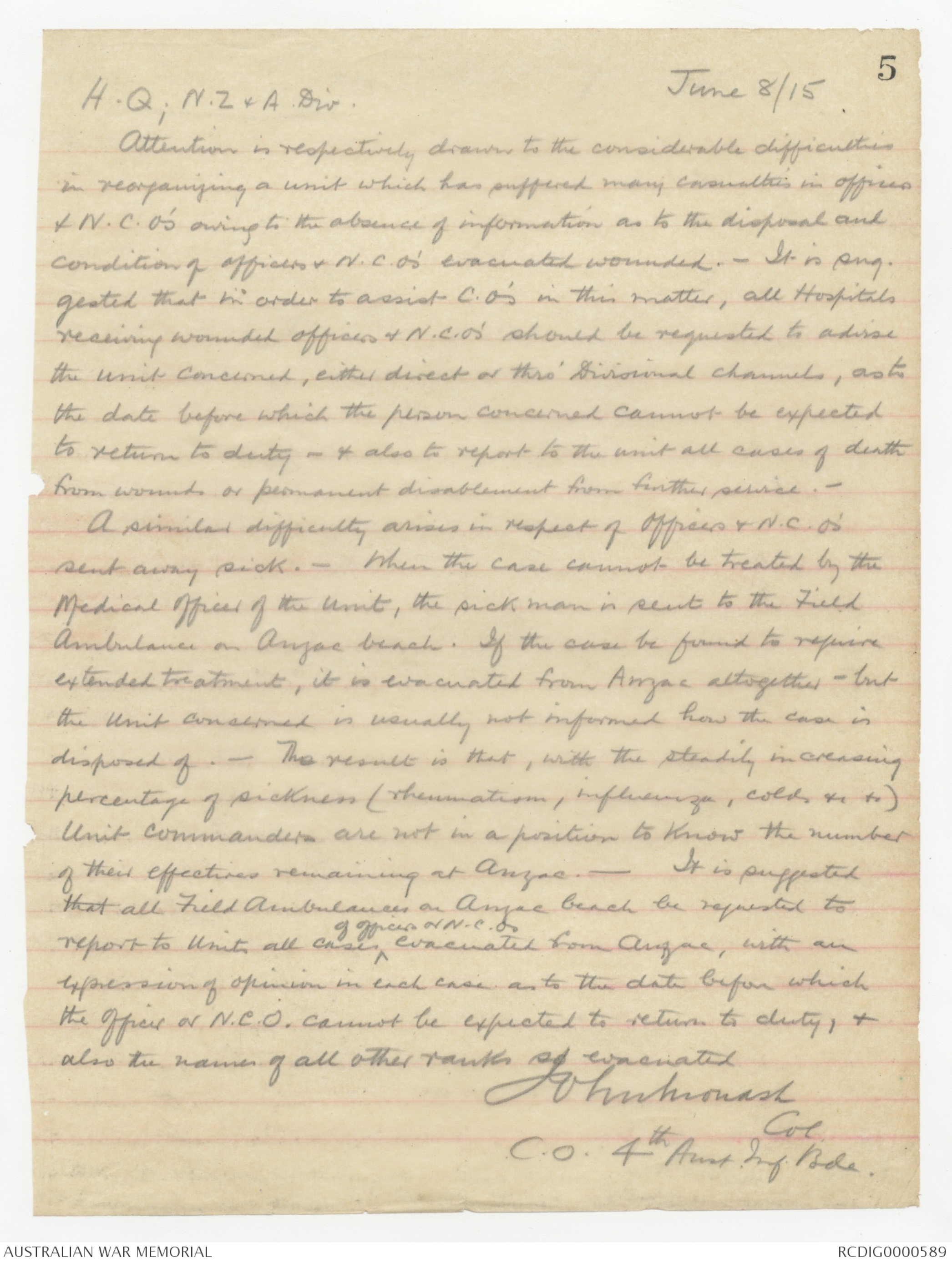
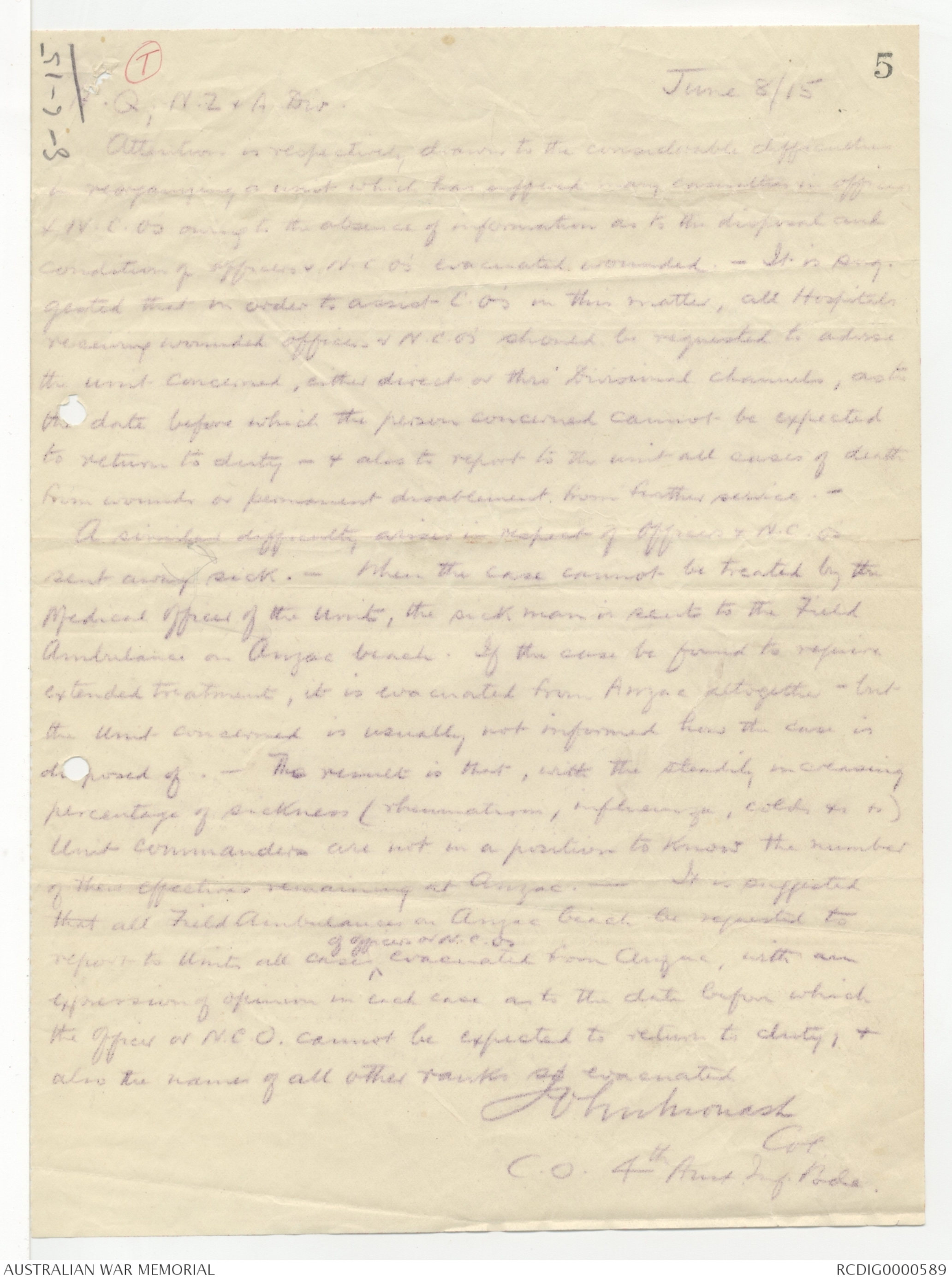
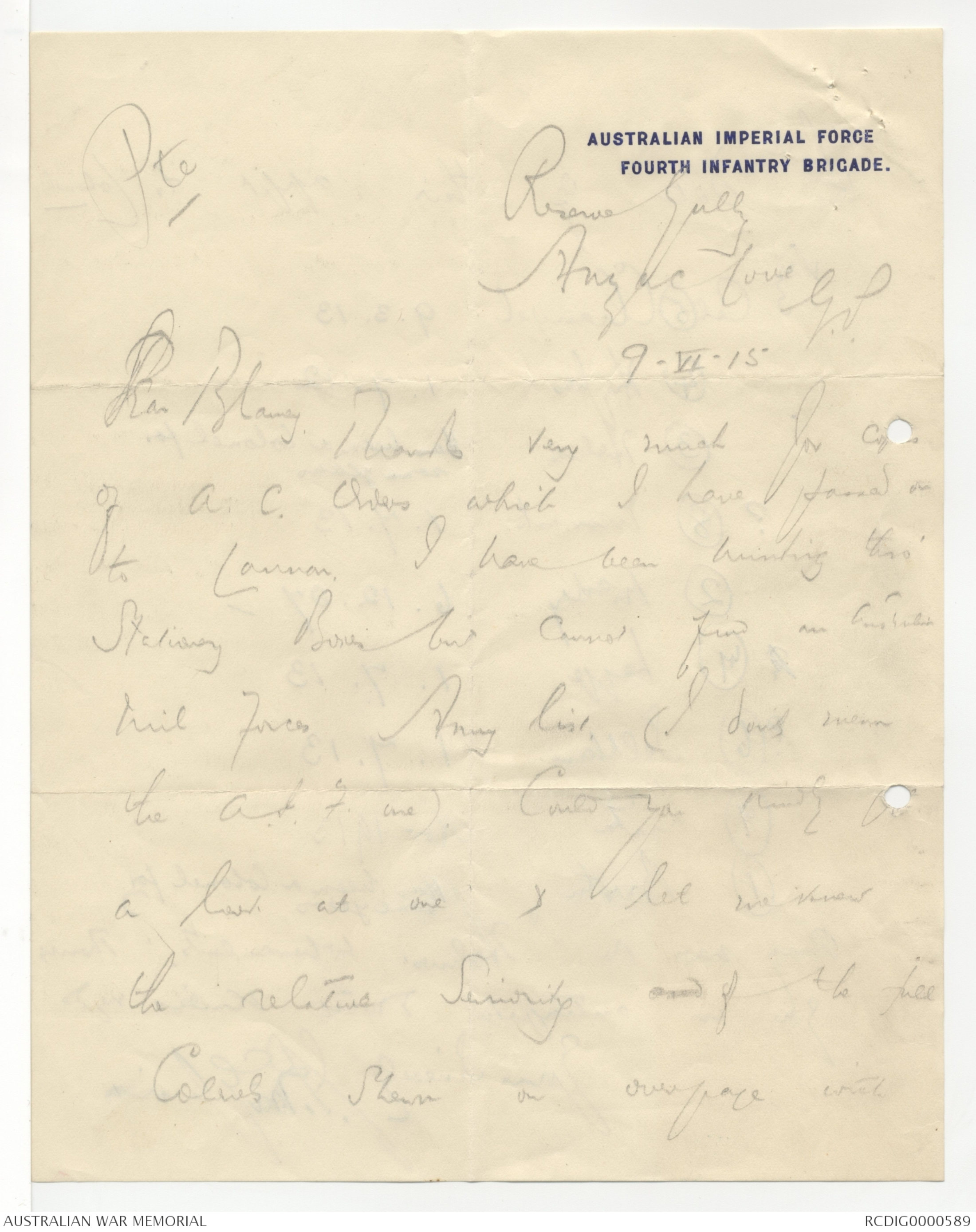
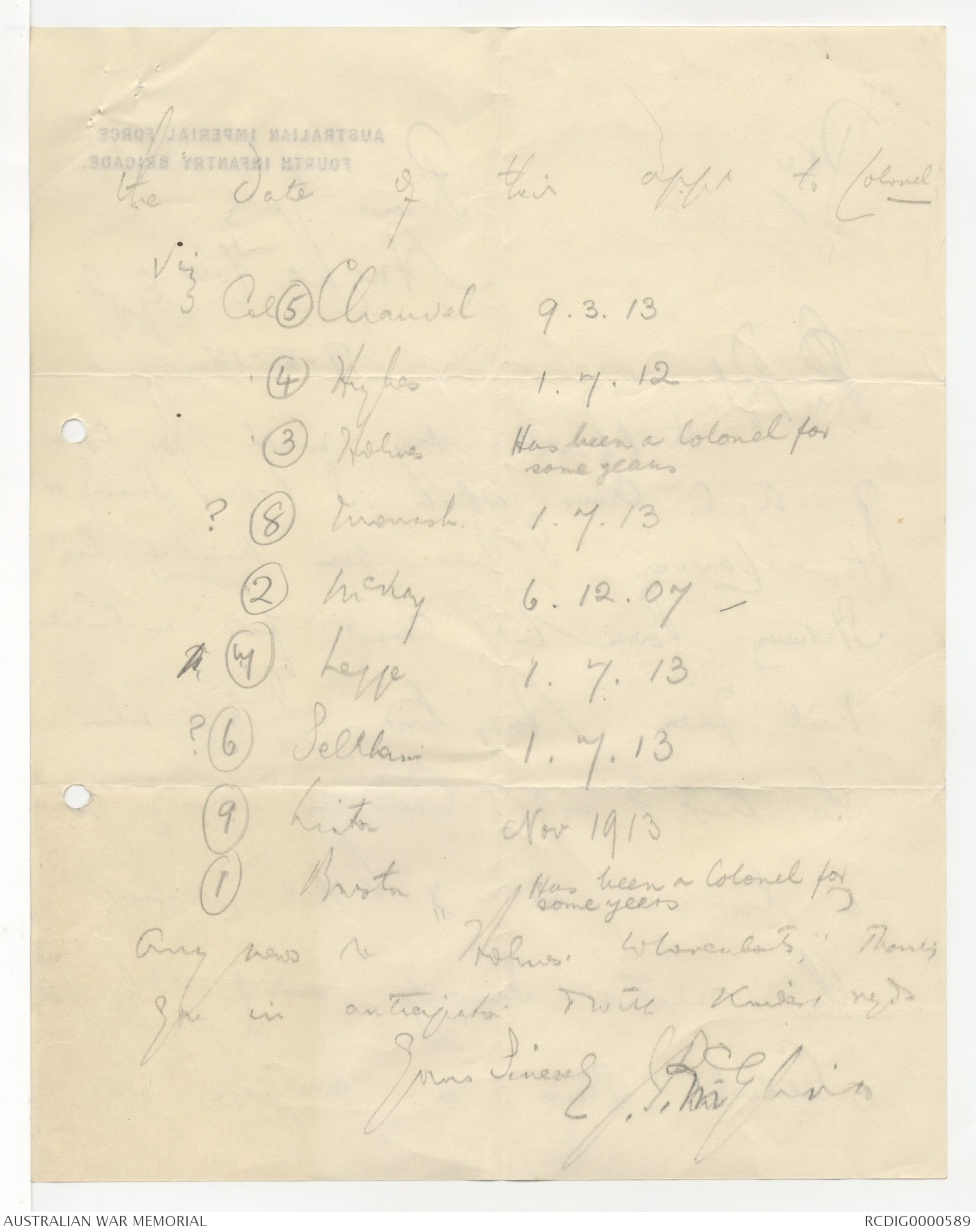
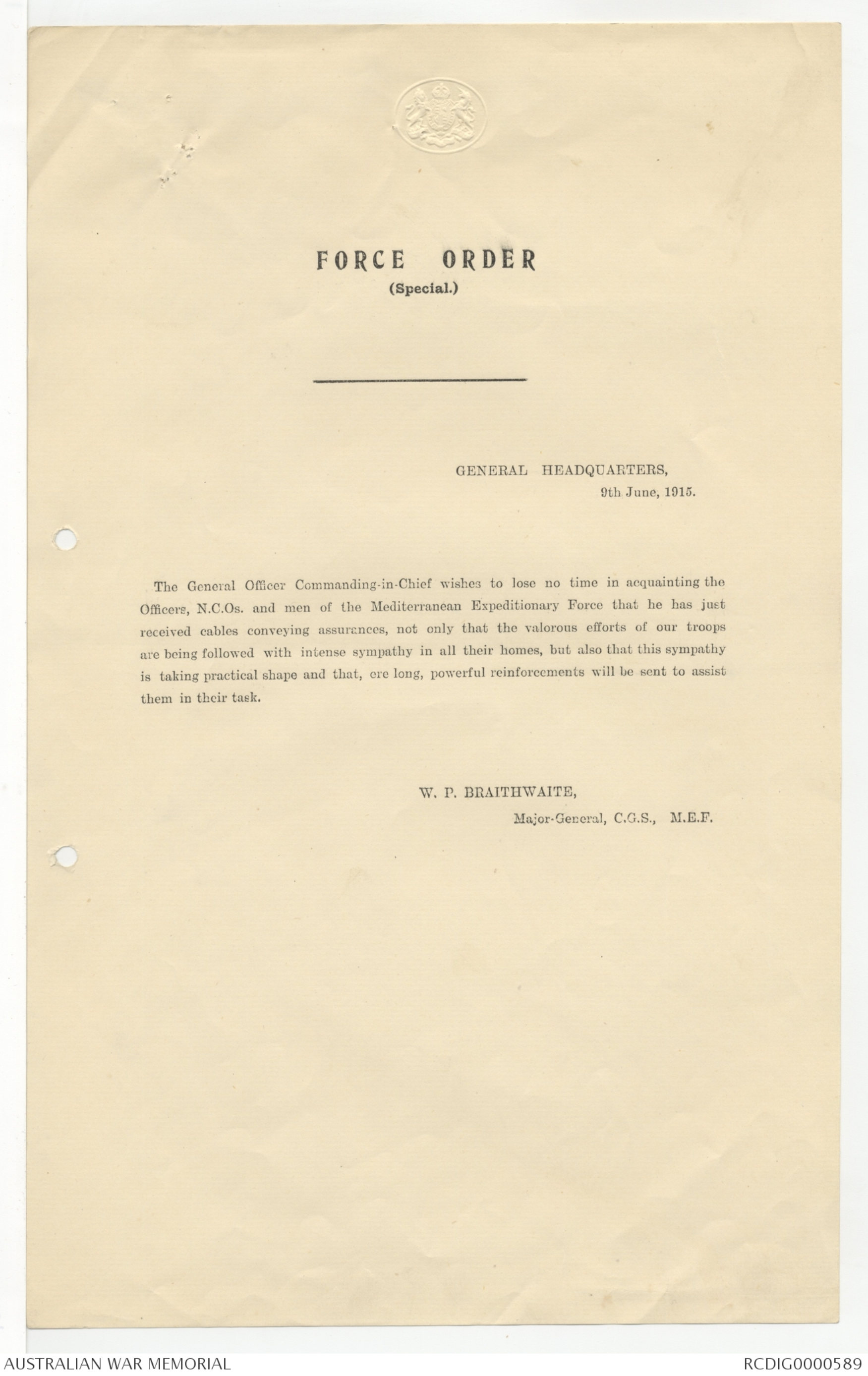
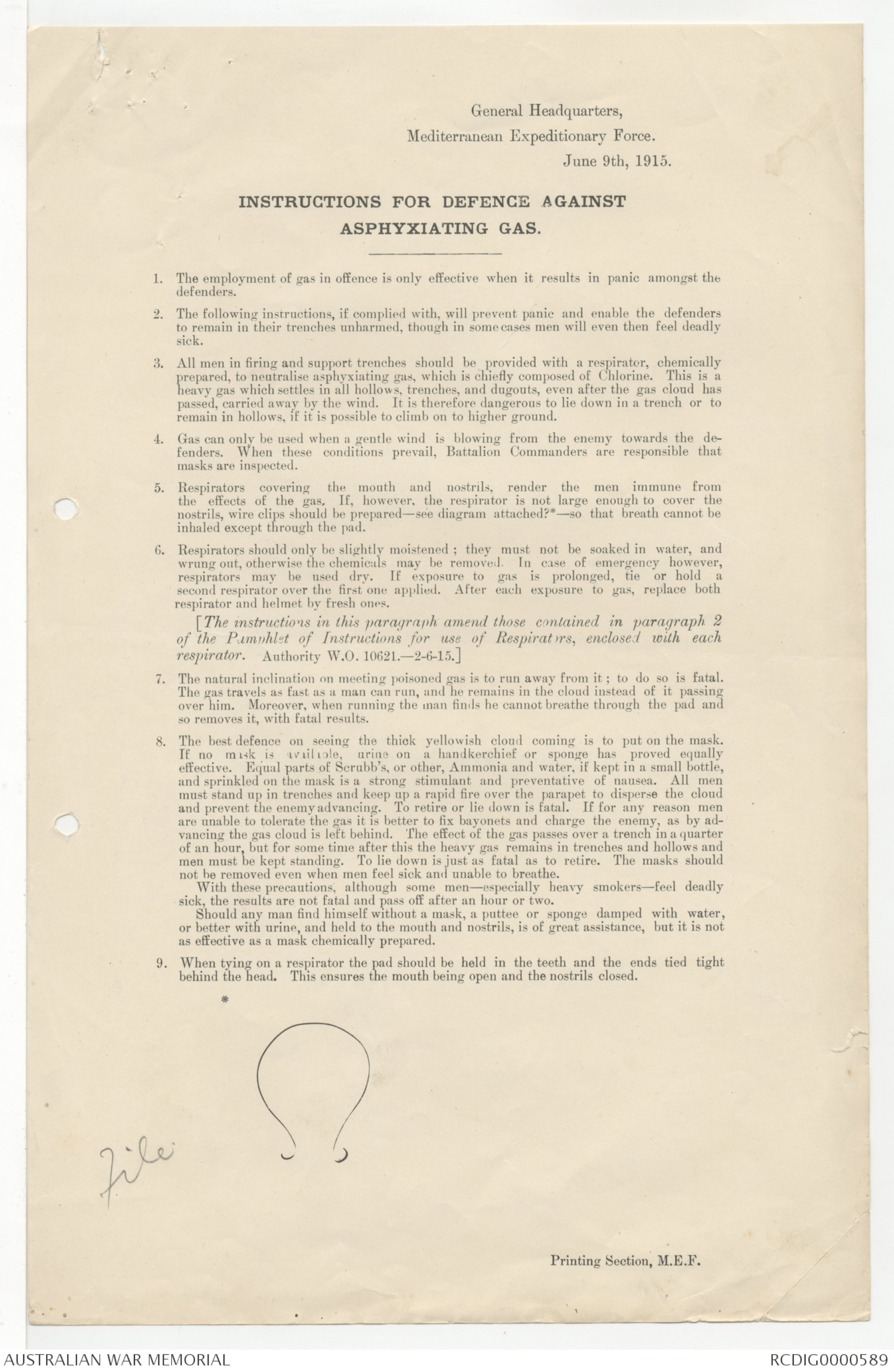
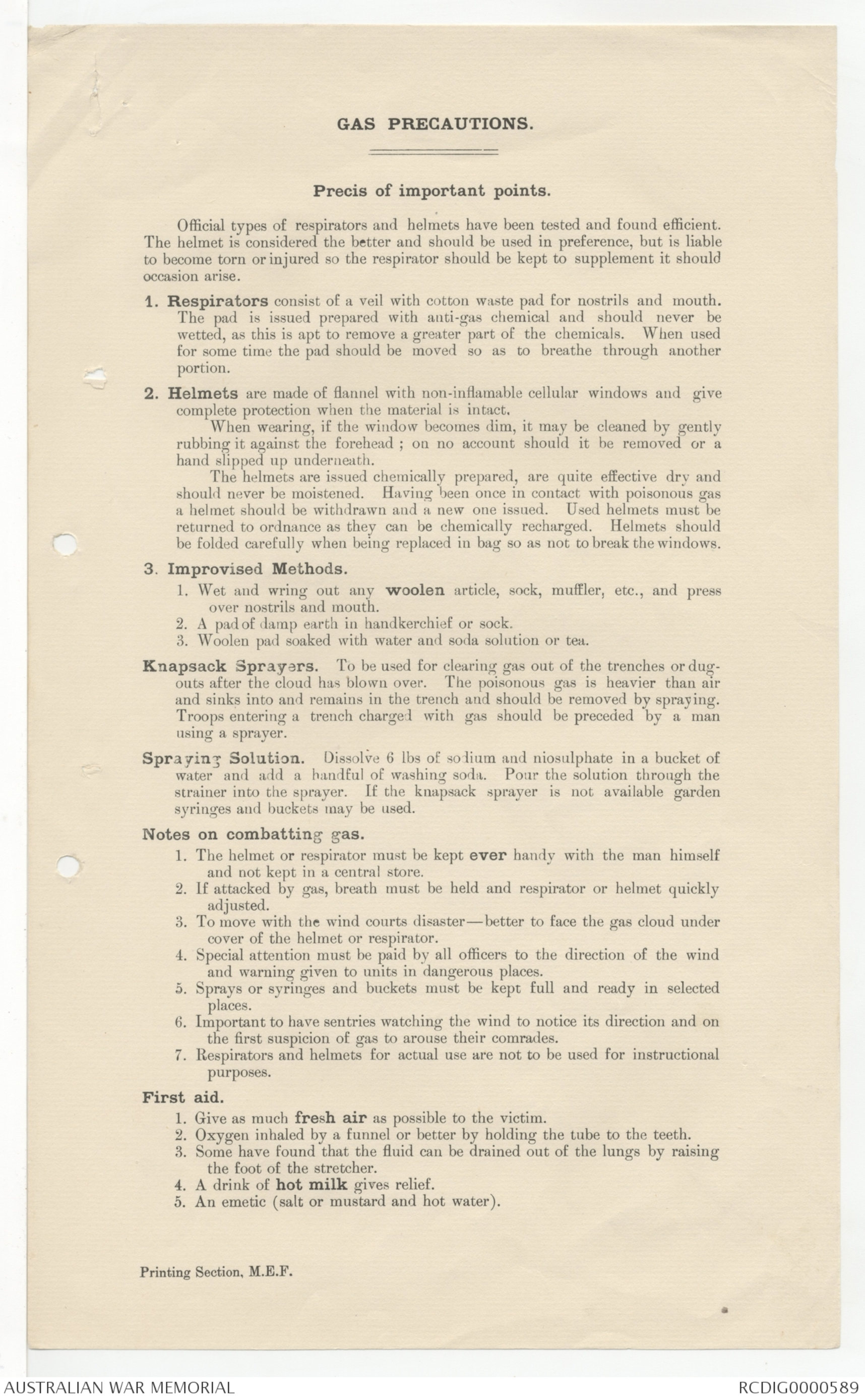
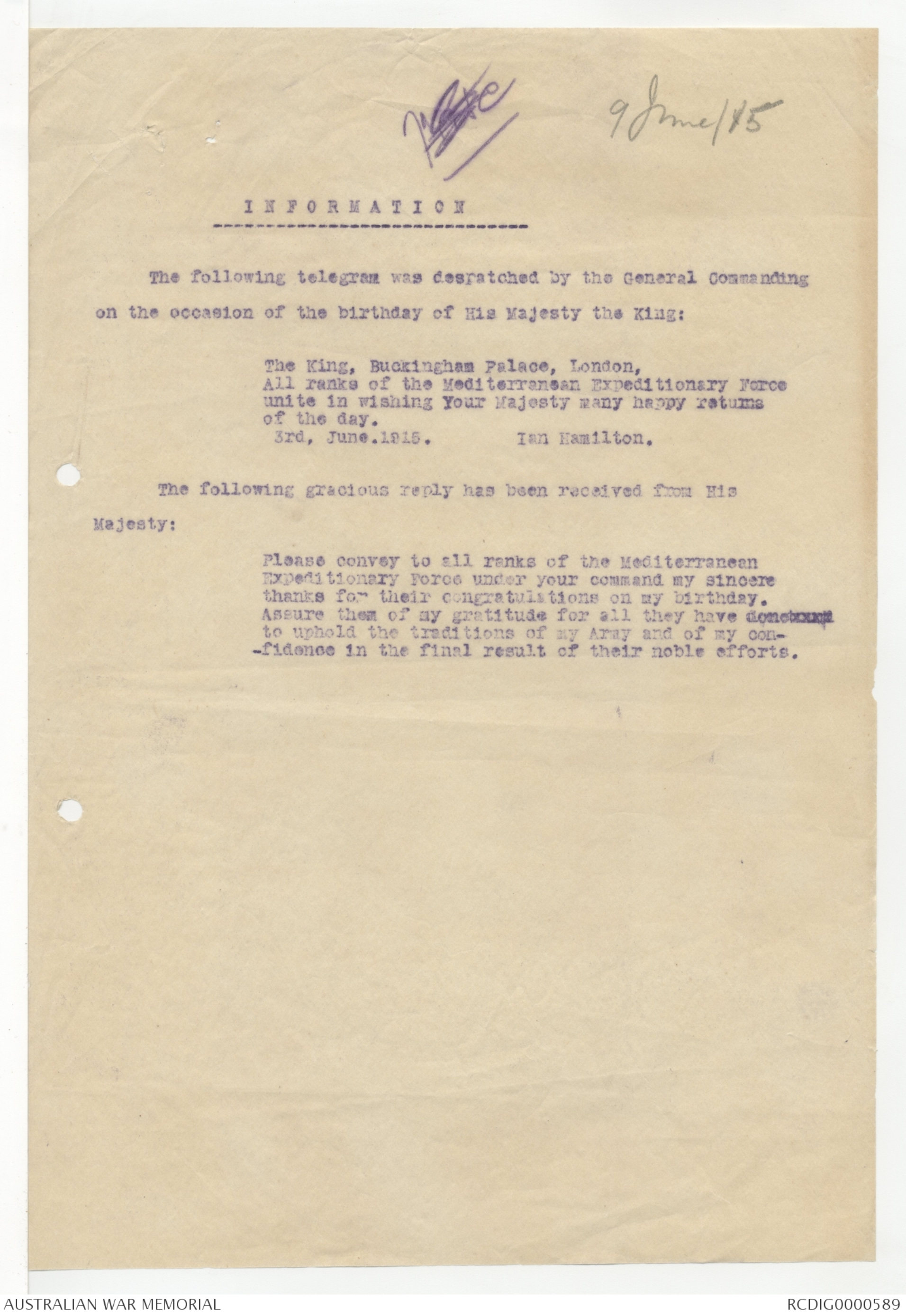
Major General Sir A.J. Godley
8/6/15 7
(*CANCELLED*)
My dear General
I have received such uniform courtesy & consideration from the
whole of your staff, from our first landing in Egypt to the present date, that
I was altogether unprepared for the strange attitude & action of Major Reid
today. - This is what happened:- Last night a wire was received as
follows "N.Z. QB505 Four representatives from each Battalion should
report AQMG this office at 9a.m. tomorrow morning to buy canteen stores. They
must come with sufficient money as no credit is allowed". - This was
done (altho' one party of four unfortunately arrived late thro' being wrongly
directed). - I also sent 2 men to represent Brigade H.Q. & signals -
but Major Reid peremptorily sent them back, saying Brigade H.Q 'should have
arranged with one of the battalions to buy what was wanted' - altho' of course
no such intimation had been given me. - He then sent ^for Lieut Cooper
(doing duty temporarily as my Staff Captain) to come all the way to H.Q.
- (taking him away from other duty at which I had set him)- merely
to tell him, in somewhat severe terms, that he should have himself
'marched down the party' - surely only a Corporal's job - & reiterating
that we had no business to send down representatives of Bgde H.Q. &
signals. - He then sent for one of my Adjutants (14th Bn) who
also had to go all the way down to the beach merely to be again told
that the Staff Captain ought to have 'marched the party down'-
What this Adjutant had to do with it is difficult to understand.
Major Reid's whole attitude is incomprehensible to me, particularly
his refusing facilities for my Brigade Head Quarters personnel
buying themselves a few luxuries - & his later action in
making 2 officers leave their work to report to him on a matter which
could have been settled offhand by me or my B.M. on the telephone.
I take the liberty of letting you know of this, in the interests of smooth
& harmonious working.
Respectfully
John Monash Col.
8/6/15 8
My dear General
I have received such uniform courtesy & consideration from the whole
of your Staff, from our first landing in Egypt to the present date, that I was altogether
unprepared for the strange action of Major Reid today. - This is what
happened.- Telegram N.Z.Q.B. 505 said "Four representatives from each Bn
should report AQMG this office at 9 a.m. tomorrow morning to buy canteen stores.
They must come with sufficient money as no credit is allowed". - This I arranged
- although one party of 4 unfortunately arrived a little late thro' being wrongly directed.
I also sent 2 men to represent my H.Q. & signals, but Major Reid peremptorily
sent them back saying this unit was not in the arrangement. - He then sent
a telegram calling for my Staff Captain (Lieut Cooper - acting temporarily - &
being at the time engaged in other important work) to go all the way to Div. H.Q.
apparently merely to tell him, in severe terms, that he should have "marched down
this party himself" - which was surely a Corporal's job, if any. - & reiterating
that I had no business to send down a representative of my H.Q. units. - He
next sent a telegram for the Adjutant of 14th Bn who also had to leave other
work, & go all the way down to the beach merely to be again told that the
Staff Captain 'ought to have marched the party down'. - What this Adjutant
had to do with it I don't know. — Major Reid's attitude &
tone are incomprehensible to me - firstly in refusing facilities for my H.Q
personnel to buy a few canteen stores - & secondly in making two busy
officers report personally to him at H.Q. to rebuke them for what
was in any case no fault of theirs on a matter which he could have
settled in a couple of minutes on the telephone by speaking to me or my
Bgde Major. — I take the liberty of bringing this matter
under your notice, in the interests of smooth & harmonious working
Respectfully
John Monash Col.
Major Gen. Sir A.J.Godley
H.Q; N.Z & A. Div.
June 8/15 5
Attention is respectively drawn to the considerable difficulties
in reorganizing a unit which has suffered many casualties in officers
& N.C.O's owing to the absence of information as to the disposal and
condition of officers & N.C.O's evacuated wounded. - It is suggested
that in order to assist C.O's in this matter, all Hospitals
receiving wounded officers & N.C.O's should be requested to advise
the unit concerned, either direct or thro' Divisional channels, as to
the date before which the person concerned cannot be expected
to return to duty - & also to report to the unit all cases of death
from wounds or permanent disablement from further service. -
A similar difficulty arises in respect of Officers & N.C.O's
sent away sick. - When the case cannot be treated by the
Medical Officer of the Unit, the sick man is sent to the Field
Ambulance on Anzac beach. If the case be found to require
extended treatment, it is evacuated from Anzac altogether - but
the unit concerned is usually not informed how the case is
disposed of. - The result is that, with the steadily increasing
percentage of sickness (rheumatism, influenza, colds, &c, &c)
Unit Commanders are not in a position to know the number
of their effectives remaining at Anzac. - It is suggested
that all Field Ambulances on Anzac beach be requested to
report to Units, all cases ^of officers or N.C.O.'s evacuated from Anzac, with an
expression of opinion in each case as to the date before which
the Officer or N.C.O. cannot be expected to return to duty, &
also the names of all other ranks so evacuated.
John Monash
Col.
C.O. 4th Aust. Inf. Bde.
(*8-6-15) (This is a carbon copy of previous letter on page 3)
T
H.Q., N.Z. & A. Div
June 8/15 5
Attention is respectively drawn to the considerable difficulties
in reorganizing a unit which has suffered many casualties in officers
& N.C.O's owing to the absence of information as to the disposal and
condition of officers & N.C.O's evacuated wounded. - It is suggested
that in order to assist C.O's in this matter, all Hospitals
receiving wounded officers & N.C.O's should be requested to advise
the unit concerned, either direct or thro' Divisional channels, as to
the date before which the person concerned cannot be expected
to return to duty - & also to report to the unit all cases of death
from wounds or permanent disablement from further service. -
A similar difficulty arises in respect of Officers & N.C.O's
sent away sick. - When the case cannot be treated by the
Medical Officer of the Unit, the sick man is sent to the Field
Ambulance on Anzac beach. If the case be found to require
extended treatment, it is evacuated from Anzac altogether - but
the unit concerned is usually not informed how the case is
disposed of. - The result is that, with the steadily increasing
percentage of sickness (rheumatism, influenza, colds, &c, &c)
Unit Commanders are not in a position to know the number
of their effectives remaining at Anzac. - It is suggested
that all Field Ambulances on Anzac beach be requested to
report to Units, all cases ∧ of officers or N.C.O.'s evacuated from Anzac, with an
expression of opinion in each case as to the date before which
the Officer or N.C.O. cannot be expected to return to duty, &
also the names of all other ranks so evacuated.
John Monash
Col.
C.O. 4th Aust. Inf. Bde.
AUSTRALIAN IMPERIAL FORCE
FOURTH INFANTRY BRIGADE.
Pte
Reserve Gully
Anzac Cove
G.P.
9-VI-15
Dear Blamey.
Thanks very much for copies
of A.C. Orders which I have passed on
to Cannan. I have been hunting thro'
Stationery Boxes but cannot find an Australian
Mil Forces Army list, (I don't mean
the A.I.F. one). Could you kindly post
a list at once & let me know
the relative Seniority and of the full
Colonels shown on over page with
the date of their appt to Colonel
Viz
Col.
(5) Chauvel 9.3.13
(4) Hughes 1.7.12
(3) Holmes Has been a Colonel for some years
?(8) Monash 1.7.13
(2) McKay 6.12.07? (7) Legge 1.7.13
? (6) Sellheim 1.7.13
(9) Linton Nov 1913
(1) Bristow Has been a Colonel for some years
Any news re Holmes' whereabouts. Thank
you in anticipation & with kindest regds
Yours sincerely
JP McGlinn
FORCE ORDER
(Special.)
GENERAL HEADQUARTERS,
9th June, 1915.
The General Officer Commanding-in-Chief wishes to lose no time in acquainting the
Officers, N.C.Os. and men of the Mediterranean Expeditionary Force that he has just
received cables conveying assurances, not only that the valorous effort of our troops
are being followed with intense sympathy in all their homes, but also that this sympathy
is taking practical shape and that, ere long, powerful reinforcements will be sent to assist
them in their task.
W. P. BRAITHWAITE,
Major-General, C.G.S., M.E.F.
General Headquarters,
Mediterranean Expeditionary Force.
June 9th, 1915.
INSTRUCTIONS FOR DEFENCE AGAINST
ASPHYXIATING GAS.
1. The employment of gas in offence is only effective when it results in panic amongst the
defenders.
2. The following instructions, if complied with, will prevent panic and enable the defenders
to remain in their trenches unharmed, though in some cases men will even then feel deadly
sick.
3. All men in firing and support trenches should be provided with a respirator, chemically
prepared, to neutralise asphyxiating gas, which is chiefly composed of Chlorine. This is a
heavy gas which settles in all hollows, trenches, and dugouts, even after the gas cloud has
passed, carried away by the wind. It is therefore dangerous to lie down in a trench or to
remain in hollows, if it is possible to climb on to higher ground.
4. Gas can only be used when a gentle wind is blowing from the enemy towards the defenders.
When these conditions prevail, Battalion Commanders are responsible that
masks are inspected.
5. Respirators covering the mouth and nostrils, render the men immune from
the effects of the gas. If, however, the respirator is not large enough to cover the
nostrils, wire clips should be prepared — see diagram attached?* — so that breath cannot be inhaled except through the pad.
6. Respirators should only be slightly moistened ; they must not be soaked in water, and
wrung out, otherwise the chemicals may be removed. In case of emergency however,
respirators may be used dry. If exposure to gas is prolonged, tie or hold a
second respirator over the first one applied, After each exposure to gas, replace both
respirator and helmet by fresh ones.
[The instructions in this paragraph amend those contained in paragraph 2
of the Pamphlet of Instructions for use of Respirators, enclosed with each
respirator. Authority W.O. 10621.-2-6-15.]
7. The natural inclination on meeting poisoned gas is to run away from it ; to do so is fatal.
The gas travels as fast as a man can run, and he remains in the cloud instead of it passing
over him. Moreover, when running the man finds he cannot breathe through the pad and
so removes it, with fatal results.
8. The best defence on seeing the thick yellowish cloud coming is to put on the mask.
If no mask is available, urine on a handkerchief or sponge has proved equally
effective. Equal parts of Scrubb's, or other, Ammonia and water, if kept in a small bottle,
and sprinkled on the mask is a strong stimulant and preventative of nausea. All men
must stand up in trenches and keep up a rapid fire over the parapet to disperse the cloud
and prevent the enemy advancing. To retire or lie down is fatal. If for any reason men
are unable to tolerate the gas it is better to fix bayonets and charge the enemy, as by advancing
the gas cloud is left behind. The effect of the gas passes over a trench in a quarter
of an hour, but for some time after this the heavy gas remains in trenches and hollows and
men must be kept standing. To lie down is just as fatal as to retire. The masks should
not be removed even when men feel sick and unable to breathe.
With these precautions, although some men — especially heavy smokers — feel deadly
sick, the results are not fatal and pass off after an hour or two.
Should any man find himself without a mask, a puttee or sponge damped with water,
or better with urine, and held to the mouth and nostrils, is of great assistance, but it is not
as effective as a mask chemically prepared.
9. When trying on a respirator the pad should be held in the teeth and the ends tied tight
behind the head. This ensures the mouth being open and the nostrils closed.
* [ Diagram of wire clip]
(*file)
Printing Section, M.E.F.
GAS PRECAUTIONS.
Precis of important points.
Official types of respirators and helmets have been tested and found efficient.
The helmet is considered the better and should be used in preference, but is liable
to become torn or injured so the respirator should be kept to supplement it should
occasion arise.
1. Respirators consist of a veil with cotton waste pad for nostrils and mouth.
The pad is issued prepared with anti-gas chemical and should never be
wetted, as this is apt to remove a greater part of the chemicals. When used
for some time the pad should be moved so as to breathe through another
portion.
2. Helmets are made of flannel with non-inflamable cellular windows and give
complete protection when the material is intact.
When wearing, if the window becomes dim, it may be cleaned by gently
rubbing it against the forehead ; on no account should it be removed or a
hand slipped up underneath.
The helmets are issued chemically prepared, are quite effective dry and
should never be moistened. Having been once in must be contact with poisonous gas
a helmet should be withdrawn and a new one issued. Used helmets must be
returned to ordnance as they can be chemically recharged. Helmets should
be folded carefully when being replaced in bag so as not to break the windows.
3. Improvised Methods.
1. Wet and wring out any woolen article, sock, muffler, etc., and press
over nostrils and mouth.
2. A pad of damp earth in handkerchief or sock.
3. Woolen pad soaked with water and soda solution or tea.
Knapsack Sprayers. To be used for clearing gas out of the trenches or dugouts
after the cloud has blown over. The poisonous gas is heavier than air
and sinks into and remains in the trench and should be removed by spraying.
Troops entering a trench charged with gas should be preceded by a man
using a sprayer.
Spraying Solution. Dissolved 6 lbs of sodium and niosulphate in a bucket of
water and add a handful of washing soda. Pour the solution through the
strainer into the sprayer. If the knapsack sprayer is not available garden
syringes and buckets may be used.
Notes on combatting gas.
1. The helmet or respirator must be kept ever handy with the man himself
and not kept in a central store.
2. If attacked by gas, breath must he held and respirator or helmet quickly
adjusted.
3. To move with the wind courts disaster - better to face the gas cloud under
cover of the helmet or respirator.
4. Special attention must be paid by all officers to the direction of the wind
and warning given to units in dangerous places.
5. Sprays or syringes and buckets must be kept full and ready in selected
places.
6. Important to have sentries watching the wind to notice its direction and on
the first suspicion of gas to arouse their comrades.
7. Respirators and helmets for actual use are not to be used for instructional
purposes.
First aid.
1. Give as much fresh air as possible to the victim.
2. Oxygen inhaled by a funnel or better by holding the tube to the teeth.
3. Some have found that the fluid can be drained out of the lungs by raising
the foot of the stretcher.
4. A drink of hot milk gives relief.
5. An emetic (salt or mustard and hot water).
Printing Section. M.E.F.
[[?JGHC]]
9 June/15
I N F O R M A T I O N
The following telegram was despatched by the General Commanding
on the occasion of the birthday of His Majesty the King:
The King, Buckingham Palace, London,
All ranks of the Mediterranean Expeditionary Force
unite in wishing Your Majesty many happy returns
of the day.
3rd, June.1915. Ian Hamilton.
The following gracious reply has been received from His
Majesty:
Please convey to all ranks of the Mediterranean
Expeditionary Force under your command my sincere
thanks for their congratulations on my birthday.
Assure them of my gratitude for all they have done toxxxx
to uphold the traditions of my Army and of my confidence
in the final result of their noble efforts.
 Arlene Baade
Arlene BaadeThis transcription item is now locked to you for editing. To release the lock either Save your changes or Cancel.
This lock will be automatically released after 60 minutes of inactivity.